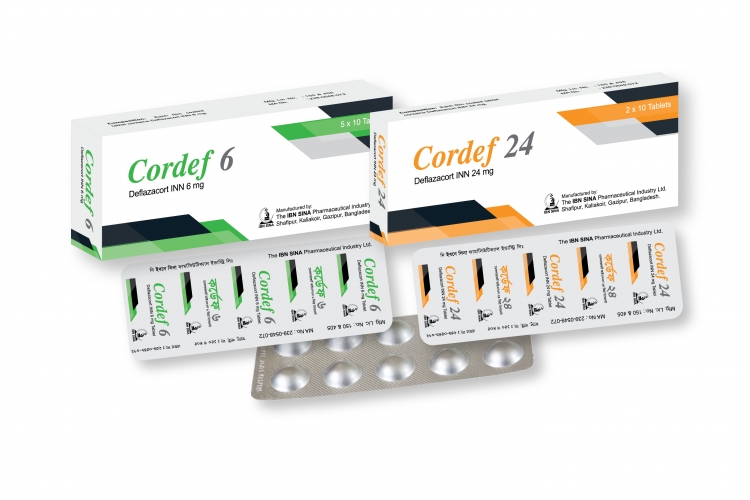
CORDEF
DEFLAZACORT INN
| NAME | STRENGTH | PACK SIZE | DOSAGE FORM |
|---|---|---|---|
| CORDEF 24 MG | 24 MG | 20 S | TABLET |
| CORDEF 6 MG | 6 MG | 50 S | TABLET |
Cordef 6 mg: Each film-coated tablet contains Deflazacort INN 6 mg.
Cordef 24 mg: Each film-coated tablet contains Deflazacort INN 24 mg.
Cordef (Deflazacort) is a glucocorticoid derived from Prednisolone and 6 mg of Deflazacort has approximately the same anti-inflammatory potency as 5 mg Prednisolone or prednisone.
Cordef is indicated for • Anaphylaxis, asthma, severe hypersensitivity reactions
• Rheumatoid arthritis, juvenile chronic arthritis, polymyalgia rheumatic
• Systemic lupus erythematosus, dermatomyositis, mixed connective tissue disease (other than systemic sclerosis), polyartritisnodosa, sarcoidosis
• Pemphigus, bullous pemphigoid, pyodermagangrenosum
• Minimal change nephrotic syndrome, acute interstitial nephritis
• Rheumatic carditis
• Ulcerative colitis, Crohn's disease
• Uveitis, optic neuritis
• Autoimmune haemolyticanaemia, idiopathic thrombocytopenic purpura
• Acute and lymphatic leukaemia, malignant lymphoma, multiple myeloma
• Immune suppression in transplantation
Adults: Usual maintenance 3-18 mg daily (acute disorders, initially up to 120 mg daily).
Child 1 month–11 years: 0.25–1.5 mg/kg daily or on alternate days; up to 2.4 mg/kg (max.120 mg) daily in emergency situations.
Child 12–17 years: 3–18 mg daily or on alternate days; up to 2.4 mg/kg (max. 120 mg) daily in emergency situations.
When Deflazacort is used for long term, the maintenance dose should be kept as low as possible. Dosage may need to be increased during exacerbation of illness. It should not stop taking this medicine suddenly if it has been taking for more than three weeks. This is because long-term use of corticosteroids can suppress the natural production of corticosteroids by the adrenal glands, which means that the body becomes temporarily reliant on the medicine. When it is time to stop treatment the dose should be tapered down gradually, to allow the adrenal glands to start producing adequate amounts of natural steroids again.
Hypersensitivity to or any of the ingredients.Patients receiving live virus immunisation.
The following clinical conditions require special caution and frequent patient monitoring is necessary-
Adrenal suppression and infection, child, adolescents, elderly, history of TB and steroid myopathy, hypertension, recent myocardial infarction, congestive heart failure, liver failure, renal impairment, diabetes mellitus and glaucoma (including family history), osteoporosis, corneal perforation, epilepsy, peptic ulcer, hypothyroidism, pregnancy and lactation.
GI disturbances, musculoskeletal, endocrine, neuropsychiatric, ophthalmic, fluid and electrolyte disturbances; susceptible to infection, impaired healing, hypersensitivity, skin atrophy, striae, telangiectasia, acne, myocardial rupture following recent MI, thromboembolism.
Pregnancy: Deflazacort does cross the placenta. However, when administered for prolonged periods or repeatedly during pregnancy, corticosteroids may increase the risk of intra-uterine growth retardation. As with all drugs, corticosteroids should only be prescribed when the benefits to the mother and child outweigh the risks.
Nursing Mother: Corticosteroids are excreted in breast milk, although no data are available for Deflazacort. Doses of up to 50 mg daily of Deflazacort are unlikely to cause systemic effects in the infant. Infants of mothers taking higher doses than this may have a degree of adrenal suppression but the benefits of breast feeding are likely to outweigh any theoretical risk.
The following medicines may interact with Deflazacort-
Antacids, ACE inhibitors, acetazolamide, adrenergic neuron blockers, antidiabetics, aspirin, barbiturate, ß-blockers, calcium-channel blockers, carbamazepine, carbenoxolone, cardiac glycosides, clonidine, coumarins, diazoxide, diuretics, erythromycin, hydralazine, ketoconazole, methotrexate, methyldopa, mifepristone, minoxidil, moxonidine, nitrates, nitroprusside, NSAIDs, oestrogens, phenytoin, primidone, rifamycins, ritonavir, somatropin, ß2 sympathomimetics, theophylline, vaccines.
Emergency medical attention is advised in case of acute overdosage.
Store in a cool (below 30º C) and dry place. Keep out of the reach of the children.
Cordef 6 mg Tablet: Each box contains 5 x 10 tablets in blister pack.
Cordef 24 mg Tablet: Each box contains 2 x 10 tablets in blister pack.
